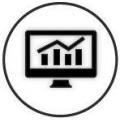In this workshop we will cover two main supervised text analysis methods, the dictionary method, and supervised classification. We will use list comprehension to implement the dictionary method, using sentiment analysis as our example.
Sign up for our weekly newsletter!
This is an archive of our past training offerings. We are looking to include workshops on topics not yet covered here. Is there something not currently on the list? Send us a proposal.
R FUN!damentals Part 4: For-loops and Functions
Students will learn how to write for-loops and functions in R. You will learn how to personalize functions via control structures such as ‘if’ and ‘else’. These learning objectives will be exemplified through introduction to the construction and graphical representation of Monte Carlo resampling simulation.
This interactive workshop will discuss how to analyze qualitative data, including how to develop codes, look for patterns, answer research questions, and build an argument in order to write the findings, discussion, and conclusion sections of a research paper. Researchers at any stage in the process are welcome.
This four-part, interactive workshop series is your complete introduction to programming Python for people with little or no previous programming experience. By the end of the series, you will be able to apply your knowledge of basic principles of programming and data manipulation to a real-world social science application.
Part 3 Topics:
This workshop focuses on how to organize and code qualitative data in Dedoose. The training will outline key decisions researchers must make in the coding process, as well as review how to start a new project and engage in basic tasks.
This hands on workshop builds on part 2 by introducing the basics of Python's scikit-learn package to implement unsupervised text analysis methods. This workshop will cover a) vectorization and Document Term Matrices, b) weighting (tf-idf), and c) uncovering patterns using topic modeling.
Come learn how to turn your data into beautiful webmaps using R and Leaflet, one of the most popular libraries for creating web maps. We’ll cover how to build the entire workflow from raw data to interactive map all within R, so your analysis and mapping are entirely reproducible.
R FUN!damentals Part 3: Data Exploration and Analysis
Students will be introduced to data exploration and analysis in R. You will learn how to summarize data and explore it with histograms, scatterplots, and boxplots. You will also be introduced to coding statistical data analysis via t-tests, analyses of variance, correlation, and linear regression.
This four-part, interactive workshop series is your complete introduction to programming Python for people with little or no previous programming experience. By the end of the series, you will be able to apply your knowledge of basic principles of programming and data manipulation to a real-world social science application.
Part 2 Topics:
This workshop focuses on how to organize and code qualitative data in MaxQDA. The training will outline key decisions researchers must make in the coding process, as well as review how to start a new project and engage in basic tasks.
This hands on workshop goes through the common “preprocessing recipe” that is used as the foundation for a variety of other applications as well as some basic natural language processing techniques. These include: a) digitization (utf 8), b) removal of stopwords, numbers, punctuation, c) tokenization, d) calculation of word frequencies / proportions, e) part of speech tagging, and f) concordan
R FUN!damentals Part 2: Subsetting and Reshaping
You've invested a lot of work in creating a digital project, but how do you ensure it has staying power? We'll look at choices you can make at the beginning of project development to influence sustainability, best practices for documentation and asset management, and how to sunset your project in a way that ensures long-term access for future researchers.
This workshop will introduce participants to the use of qualitative data analysis (QDA) software and provide an overview of popular programs. This workshop is ideal for researchers who are new to the idea of using QDA software.
This four-part, interactive workshop series is your complete introduction to programming Python for people with little or no previous programming experience. By the end of the series, you will be able to apply your knowledge of basic principles of programming and data manipulation to a real-world social science application.
Part 1 Topics:
This non-technical workshop provides an overview of computational text analysis methods and tools. No experience in this area is expected or required. The goal is to provide an orientation for those wishing to go further with text analysis and interpret results of these methods.
Geospatial data are an important component of social science and humanities data visualization and analysis. The R programming language is a great platform for exploring these data and integrating them into a research project.
Geospatial Data in R, part 2: Geoprocessing and analysis
Data are the foundations of the social and biological sciences. Familiarizing yourself with a programming language can help you better understand the roles that data play in your field. Learn to develop and train your data skills at the free D-Lab R workshops!
This workshop offers a very basic introduction to qualitative research. First, an overview of the qualitative research process will be presented. Then, attendees will briefly explore (a) philosophical considerations regarding research, (b) qualitative methodologies and methods, and (c) ways in which technology can aid the qualitative research process.
This workshop will cover theory and techniques for maximizing the effectiveness of figures used for visualizing information. Rather than teaching any particular visualization software, this course will teach students about the "nuts and bolts" of effective data visualization.






